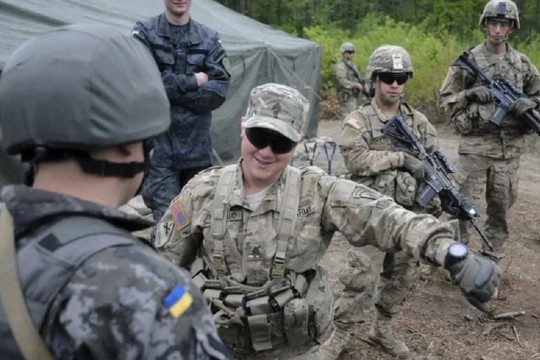NATO officer shows Ukrainian soldier: ‘Time is running out – it's time to fight.’
“I said to the Ukrainians last year, when I drove 11 hours to be given a list – I said, I am not Amazon.” Do these words by Ben Wallace (British Minister of Defence), reported by Sky News, mark a shift in tone from the Government?
Heretofore, the United Kingdom has distinguished itself in its enthusiastic commitment to the Ukrainian cause. Boris Johnson, in particular, seemed hardly able to keep himself away from the streets of Kiev. As the British Foreign Policy Group noted in February:
“The UK’s material contribution is second only to that of the US. And, beyond Ukraine’s immediate neighbours (and potentially Russia’s next victims) Poland and the Baltic states, elite and public opinion in the UK has been most strongly supportive of the people and the armed forces of Ukraine.”
As far as domestic politics goes, there isn’t any apparent cause for that enthusiasm to have waned. And indeed, government sources insist that it hasn’t.
But not every country has the same balance of opinion. In particular the politics of Ukraine in the United States is much more precarious. With a Republican victory in next year’s presidential election a live possibility, the mounting scepticism of Republican politicians and voters towards America’s commitment is extremely significant.
Other crucial nations also need to square their support for Ukraine with more sceptical electorates. In France, the souverainiste Rassemblement National has become a permanent fixture of the presidential run-off; Germany is grappling with the rise of Alternative für Deutschland.
The problem isn’t so much that this represents a surge in active pro-Russian sentiment so much as a disinclination to make expensive commitments to Ukraine at a time of economic difficulty at home.
As a result, even governments which are foursquare behind Kiev themselves need to keep an eye on their electorates. This perhaps helps to explain why the US and Germany have been more resistant than other nations to accelerate Ukraine’s accession to NATO; the FT reports that “other members of the alliance were caught off-guard by the “conservative” US and German stance”.
(America can perhaps also be forgiven, given that it does most of the heavy lifting regarding NATO’s actual military capacity, of treating warily any enthusiasm from nations which barely manage the two per cent spending commitment, or miss it entirely, for writing cheques it would fall largely to Washington to cash.)
This puts the rest of Wallace’s remarks in some useful context. “There is a slight word of caution here, which is that whether we like it or not people want to see gratitude”, he said, adding:
“My counsel to the Ukrainians is sometimes you’re persuading countries to give up their own stocks and yes the war is a noble war and yes we see it as you doing a war for – not just yourself – but our freedoms.
“But sometimes you’ve got to persuade lawmakers on the Hill in America, you’ve got to persuade doubting politicians in other countries that you know that it’s worth it and it’s worthwhile and that they’re getting something for it.
“And whether you like that or not, that is just the reality of it.”
It sounds like good advice. Even in the UK, where support is very high and which has at least some pre-existing moral obligation to Ukraine as a signatory of the Budapest Memorandum (which offered guarantees to Ukraine, Kazakhstan, and Belarus in exchange for each surrendering its post-Soviet nuclear weapon stockpiles), the entitled tone employed by some Ukrainian figures when demanding weapons can grate.
How much worse must it play in other countries which don’t have that existing commitment, and where public support for intervention is weaker? – writes ‘Conservative Home’.
read more in our Telegram-channel https://t.me/The_International_Affairs

 12:02 14.07.2023 •
12:02 14.07.2023 •























